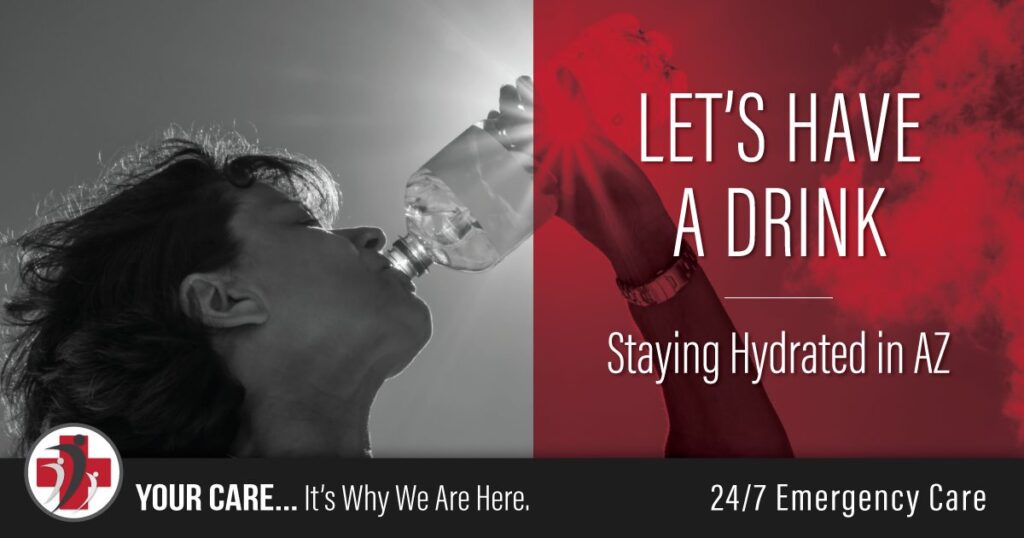Things are starting to heat up in Fountain Hills, which means a few things: cold weather attire must be on-hand to ward off the air conditioning in stores, walking barefoot outside is now considered an act of self-torture, and it’s becoming harder to stay properly hydrated.
As Arizona’s temperature starts its steady summer climb, we want you to focus some attention on drinking enough fluids. And if you think you know enough about this topic, we have a few facts that might surprise and educate you:
- 75% of Americans are chronically dehydrated. Many may consume the suggested amount of fluids per day, but their hydration is negated by a diet of high sodium and caffeine.
- After a period of mild to moderate dehydration, the body can become fully hydrated again in just 45 minutes. This means that in under an hour, even the chronically-dehydrated among us can start to feel and function better after drinking a few cups of water. (We’re talking to YOU – get yourself a glass of water right now!)
- Mild to moderate dehydration can present in lots of different ways including hunger pangs, thirst, irritability, confusion, constipation, bad breath, dark-colored urine, fatigue, muscle cramps, dry skin, headaches, and more. Not getting enough fluids can also negatively affect your immune system.
- The Mayo Clinic recommends that in moderate climates, men need 15.5 cups and women need 11.5 cups of fluid per day. Other sources suggest that men and woman drink half their body weight in ounces per day. This means a 180-pound man would need 90 ounces per day to stay fully hydrated. Keep in mind that these recommendations are for milder climates, and for people living in Arizona those totals should be increased. Working or exercising outside? The Arizona Department of Health Services ups those numbers to 1 to 2 liters per hour that you are outside.
And what if the level of dehydration in yourself or someone else reaches a dangerous level? Here’s how to know, and what to do:
-
Know the signs
Moderate to severe dehydration symptoms include feeling dizzy, fainting, sunken eyes, rapid breathing, rapid heartrate, diarrhea, a change in alertness, dry skin, or decreased urine output.
-
Know when to get help
If you or a loved one are experiencing any of the above symptoms, seek out emergency care immediately. Severe dehydration, if left untreated, can lead to permanent brain damage, seizures, kidney failure, coma, or even death.
-
Know WHERE to get help
When you need dehydration help in Arizona fast, Fountain Hills Medical Center and ER is here for you. When you arrive at Fountain Hills ER, you may receive a physical exam, receive IV fluids, be asked to provide a urine or blood sample, and be tested for kidney malfunction.
Not sure whether you need an urgent or emergency visit, or just a routine consultation?
Simply come to our complete medical center. Our primary care clinic welcomes walk-in visits, and our emergency care center is open 24 hours per day. We will help you determine the severity of your problem. Fountain Hills Medical Center is your source for expert medical care, close to home.
Sources:
- National Library of Medicine
- Journal of Strength and Conditioning
- Everyday Health
- Web MD
- Mayo Clinic
- Arizona Department of Health Services

